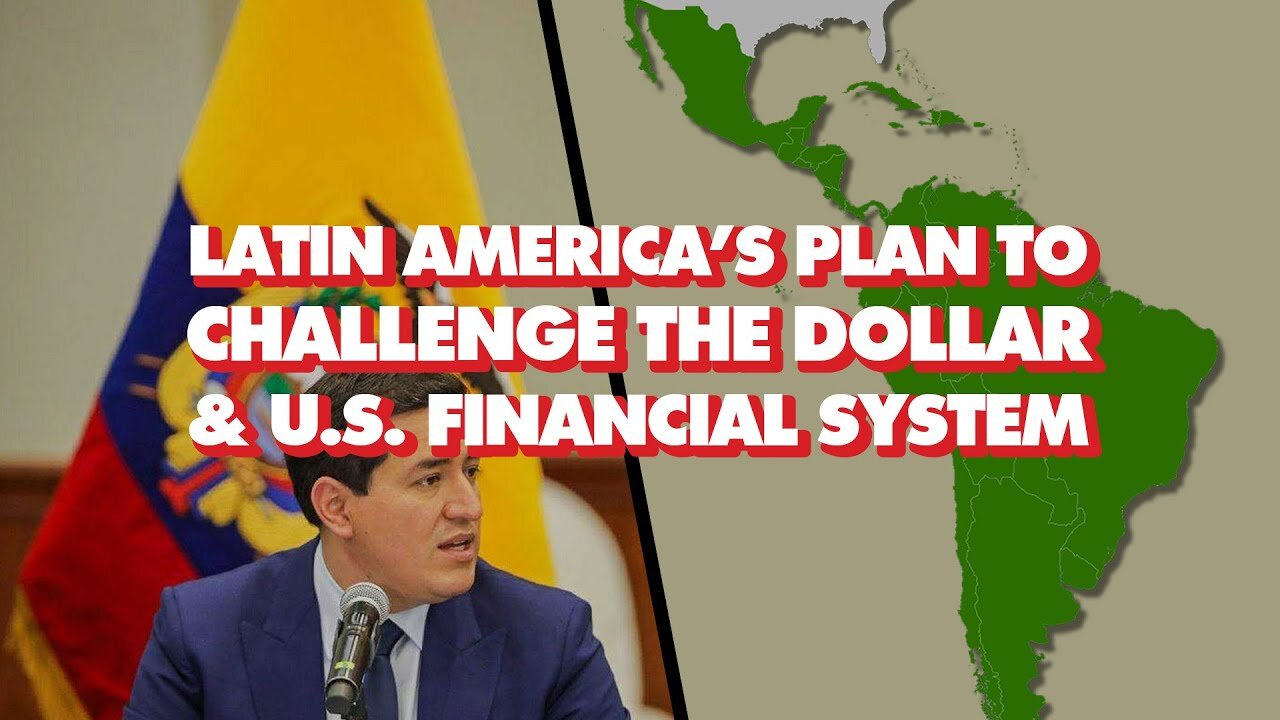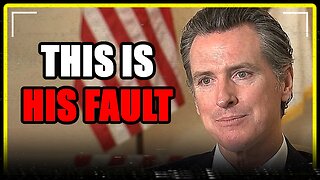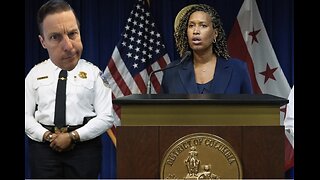Premium Only Content

Latin America's Plan to Challenge the US Dollar with NEW CURRENCY
Latin America's Plan to Challenge the US Dollar with NEW CURRENCY and 'Regional Financial Architecture'
Dec. 2, 2022
Multipolarista - Benjamin Norton
Advising Brazil's President-elect Lula, Ecuador's leftist leader Andrés Arauz made a blueprint for a "new regional financial architecture" to unite Latin America, bypassing the US dollar and IMF
The US dollar is used in the majority of international trade, and its status as the global reserve currency gives the United States an "exorbitant privilege" that underpins its geopolitical and economic dominance.
Yet opposition to Washington's hegemony is growing around the world. Institutions of Eurasian integration are proposing their own currencies and payment systems. Latin America, too, has ambitious plans to end its dependence on the US dollar.
Prominent economist Andrés Arauz, a leftist leader who came close to winning Ecuador's 2021 presidential elections, published a blueprint for a "new regional financial architecture" to unite Latin America, challenging the hegemony of the dollar and Washington-dominated institutions like the International Monetary Fund.
His plan centers around creating a new regional currency for international transactions, thereby bypassing the dollar.
The framework is based on a proposal made by Brazil's President-elect Lula da Silva, who pledged before winning the October election that "we are going to create a currency in Latin America," in order to "be freed of the dollar."
The currency is expected to be called the Sur ("south" in Spanish), and would be overseen by a newly created Banco Central del Sur (Central Bank of the South).
To do all of this, Arauz has advised Lula to revive and strengthen existing institutions of regional integration like the Union of South American Nations (UNASUR) and the Banco del Sur (Bank of the South), which were undermined by US-backed coups and the rise of right-wing governments.
The goal is "to harmonize the payment systems of" the countries that make up UNASUR in order "to carry out inter-bank transferences to any bank inside of the region in real time and from a cellphone," explained Arauz.
The Ecuadorian economist also insisted that Latin America should reject the US-dominated International Monetary Fund (IMF) and work with Africa to create debt relief and new economic opportunities.
US dollar used in 96% of trade in the Americas
Both Lula and Arauz have made it clear that the Sur would not replace local currencies, like the European Union's euro. Countries in Latin America would still have their own national currencies, so they can pursue a sovereign monetary policy.
Rather, the idea is to use the Sur for bilateral trade between countries, in place of the dollar.
The proposal is very popular in Latin America, given that it is the world's most dependent region on the US dollar.
The dollar was used in 96% of trade transactions between countries in the Americas from 1999-2019, according to the Federal Reserve.
The creation of the Sur currency could fundamentally change this.
Latin America's combined economy is nearly one-half of the US economy
Most trade in the Americas is dominated by the United States, which has the world's second-largest economy (after the People's Republic of China, when measured with purchasing power parity).
The GDP of the United States is roughly $23 trillion, while that of Canada is nearly $2 trillion.
It is often reported that the nominal GDP of Latin America and the Caribbean is around $5.5 trillion, according to World Bank data, and that the three largest economies in the region are Brazil ($1.6 trillion), Mexico ($1.3 trillion), and Argentina ($491 billion).
But nominal GDP measurements can be misleading, and only reinforce the hegemony of the US dollar. A much more accurate measurement of GDP, purchasing power parity (PPP), takes into account the cost of living in each respective country.
Adjusted accordingly with PPP measurements, the more precise estimate of the GDP of Latin America and the Caribbean is actually $11.4 trillion, with Brazil at $3.4 trillion, Mexico at $2.6 trillion, and Argentina at $1.1 trillion.
This shows that the combined economies of Latin America and the Caribbean make up nearly half of the size of the US economy.
The region is also very rich in natural resources, including oil, minerals, and agriculture.
If Latin America could unify with its own independent financial institutions, it has enormous economic potential.
The (aborted) birth of the Bank of the South
Latin America's vast economic potential has long been recognized by left-wing, anti-imperialist leaders in the region.
In the 2000s, the leftist presidents of Venezuela (Hugo Chávez), Brazil (Lula da Silva), Argentina (Néstor Kirchner and Cristina Fernández de Kirchner), Bolivia (Evo Morales), Ecuador (Rafael Correa), and Paraguay (Fernando Lugo) made plans to create alternative financial institutions to challenge the US-dominated World Bank and IMF.
The World Bank and IMF have a history of trapping Global South countries in unpayable odious debt, and subsequently imposing neoliberal "structural adjustment" programs that force governments to implement suffocating austerity policies that benefit US corporations.
Following the vision of Venezuela's revolutionary President Hugo Chávez, Latin America's left-wing leaders agreed to create a bank aimed at regional unity, called the Banco del Sur (Bank of the South).
Chávez, Lula, the Kirchners, Morales, and Correa met in Argentina in 2007 and signed a treaty officially creating the bank.
But the launch of the Banco del Sur was delayed.
In 2009, the leaders of these countries met again for the Africa-South America Summit (ASA) in Venezuela, where they vowed a combined $20 billion in initial capital.
These plans were never realized, however.
Several leftist governments in Latin America were destabilized and overthrown in a series of brutal geopolitical attacks waged by the United States and right-wing oligarchies - namely several US-sponsored coups: a military coup in Honduras in 2009, judicial coup in Paraguay in 2012, internal coup in Ecuador in 2017, soft coups in Brazil in 2016 and 2018, and violent coup in Bolivia in 2019, as well as numerous failed coup attempts in Venezuela and Nicaragua.
These US attacks and the ensuing right-wing surge also led to the sabotage of another key instrument of regional integration, the Union of South American Nations (UNASUR).
While the Banco del Sur was meant to economically integrate the region, political integration was be overseen by UNASUR.
UNASUR was formally created in a 2008 treaty, and officially operational by 2011.
But as Washington prepared another coup attempt against Venezuela, in 2018 and 2019, the right-wing leaders of Brazil, Argentina, Colombia, Chile, Peru, and Paraguay coordinated together to withdraw from UNASUR, leaving the institution very weak.
Another important regional institution created in parallel to the Banco del Sur and UNASUR was the ALBA: the Alianza Bolivariana para los Pueblos de Nuestra América (Bolivarian Alliance for the Peoples of Our America).
Venezuela and Cuba formed the ALBA in 2004 as an economic alliance of left-wing governments in Latin America and the Caribbean.
The ALBA created its own currency for inter-state trade in the region. Adopted in 2009, it was called the Sucre: the "Unified System for Regional Compensation." (This acronym also referenced the South American revolutionary Antonio José de Sucre, who joined General Simón Bolívar in the anti-colonialist struggle against the Spanish empire in the early 19th century.)
At its peak, the ALBA brought together Venezuela, Cuba, Nicaragua, Bolivia, Ecuador, and Honduras in a trade bloc, and they used the Sucre in more than $1 billion in bilateral trade in 2012.
Chávez's dream of unifying the region was undermined by his untimely death in 2013, and what followed was a devastating US economic war waged against Venezuela, including an artificial US-orchestrated commodities crash in 2014, several violent Washington-backed coup attempts, the imposition of harsh sanctions that gradually escalated into a Cuba-style embargo, and the Donald Trump's attempt to forcibly install unelected coup leader Juan Guaidó as supposed "interim president."
READ MORE: https://multipolarista.substack.com/p/latin-america-us-dollar-currency
Original: https://youtu.be/4acHVf_rnJ8
=
Please support Multipolarista at https://multipolarista.com/support
Patreon: https://www.patreon.com/multipolarista
Podcast: https://soundcloud.com/multipolarista
Telegram: https://t.me/multipolarista
-
 LIVE
LIVE
Rallied
23 minutes agoWARZONE SOLO CHALLENGES ALL DAY
199 watching -
 LIVE
LIVE
Nerdrotic
2 hours ago $1.58 earnedTransient Lunar Phenomenon: Deeper into the Mysteries of the Moon | Forbidden Frontier #112
590 watching -
 2:58:44
2:58:44
Barry Cunningham
1 day agoBREAKING NEWS: PRESIDENT TRUMP ABSOLUTELY TROLLS THE MEDIA! BIG WEEK AHEAD!
57.4K79 -
 1:37:28
1:37:28
Sarah Westall
3 hours agoReal Intel: Power Struggles Fueled by Blackmail, Surveillance & Coercion w/ Dr. Dave Janda
18.2K9 -
 9:49
9:49
MattMorseTV
5 hours ago $9.89 earnedNewsom's CAREER just WENT UP IN FLAMES.
21.6K59 -
 LIVE
LIVE
Spartan
3 hours agoHalo for a bit, Octopath after maybe
125 watching -
 3:49:55
3:49:55
sophiesnazz
4 hours ago $2.04 earned6kd in these lobbies !socials !specs
23.7K1 -
 LIVE
LIVE
Vedic compatability astrology
2 hours agoAbijit Shuckla: The Epic 8, 17, 25 Adventure!
76 watching -
 1:17:18
1:17:18
Jeff Ahern
5 hours ago $13.30 earnedThe Sunday Show with Jeff Ahern
41.1K6 -
 4:17:59
4:17:59
The Rabble Wrangler
5 hours agoSunday Shootouts in Battlefield 6 - Phantom Edition Giveaway!
14.1K